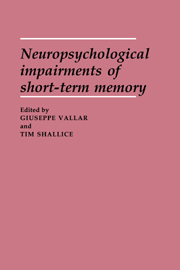Book contents
- Frontmatter
- Contents
- List of contributors
- Acknowledgments
- General introduction
- I THE FUNCTIONAL ARCHITECTURE OF AUDITORY–VERBAL (PHONOLOGICAL) SHORT-TERM MEMORY AND ITS NEURAL CORRELATES
- II PHONOLOGICAL SHORT-TERM MEMORY AND OTHER LEVELS OF INFORMATION PROCESSING: STUDIES IN BRAIN-DAMAGED PATIENTS WITH DEFECTIVE PHONOLOGICAL MEMORY
- III SHORT-TERM MEMORY STUDIES IN DIFFERENT POPULATIONS (CHILDREN, ELDERLY, AMNESICS) AND OF DIFFERENT SHORT-TERM MEMORY SYSTEMS
- IV PHONOLOGICAL SHORT-TERM MEMORY AND SENTENCE COMPREHENSION
- 14 Short-term memory and language comprehension: a critical review of the neuropsychological literature
- 15 Neuropsychological evidence on the role of short-term memory in sentence processing
- 16 Short-term memory impairment and sentence processing: a case study
- 17 Phonological processing and sentence comprehension: a neuropsychological case study
- 18 Working memory and comprehension of spoken sentences: investigations of children with reading disorder
- Name index
- Subject index
14 - Short-term memory and language comprehension: a critical review of the neuropsychological literature
Published online by Cambridge University Press: 11 May 2010
- Frontmatter
- Contents
- List of contributors
- Acknowledgments
- General introduction
- I THE FUNCTIONAL ARCHITECTURE OF AUDITORY–VERBAL (PHONOLOGICAL) SHORT-TERM MEMORY AND ITS NEURAL CORRELATES
- II PHONOLOGICAL SHORT-TERM MEMORY AND OTHER LEVELS OF INFORMATION PROCESSING: STUDIES IN BRAIN-DAMAGED PATIENTS WITH DEFECTIVE PHONOLOGICAL MEMORY
- III SHORT-TERM MEMORY STUDIES IN DIFFERENT POPULATIONS (CHILDREN, ELDERLY, AMNESICS) AND OF DIFFERENT SHORT-TERM MEMORY SYSTEMS
- IV PHONOLOGICAL SHORT-TERM MEMORY AND SENTENCE COMPREHENSION
- 14 Short-term memory and language comprehension: a critical review of the neuropsychological literature
- 15 Neuropsychological evidence on the role of short-term memory in sentence processing
- 16 Short-term memory impairment and sentence processing: a case study
- 17 Phonological processing and sentence comprehension: a neuropsychological case study
- 18 Working memory and comprehension of spoken sentences: investigations of children with reading disorder
- Name index
- Subject index
Summary
Introduction
Research on memory has provided considerable evidence for a verbal short-term memory (STM) system that is involved in memory tasks, such as span, free recall, probe recognition, and the Brown–Peterson paradigm, in which subjects must retain small amounts of linguistic information over brief periods of time. There is evidence that the representations in STM include phonological forms (Conrad, 1964) and that these representations are maintained in STM in part through a process that involves articulatory rehearsal (Baddeley, Thomson, & Buchanan, 1975). The specific character of the STM system is the subject of investigation and debate. One view (see Shallice & Vallar, chapter 1, and Baddeley, chapter 2, this volume) maintains that auditorily presented items are entered into a phonological store (PS) directly (Salame & Baddeley, 1982; Baddeley, Lewis, & Vallar, 1984; Greene & Crowder, 1984), while printed items are entered, at least in part, through a controlled process of subvocal rehearsal (Murray, 1968; Levy, 1971; Peterson & Johnson, 1971; Estes, 1973; Baddeley et al., 1984). There appears to be a progressive diminishing of the strength of the phonological representations in the phonological store over a period that has been variously estimated to last between 2 and 20 sec (Crowder & Morton, 1969; Wickelgren, 1969; Darwin, Turvey, & Crowder, 1972). However, the strength of these representations can be increased through the controlled use of articulatory rehearsal processes (the articulatory loop [AL]: Baddeley et al., 1984; Baddeley and Lewis, 1984).
- Type
- Chapter
- Information
- Neuropsychological Impairments of Short-Term Memory , pp. 337 - 389Publisher: Cambridge University PressPrint publication year: 1990
- 55
- Cited by

